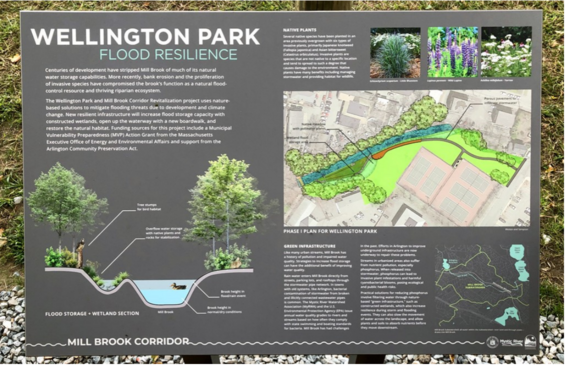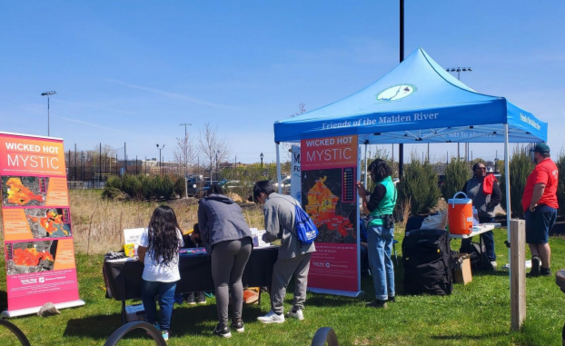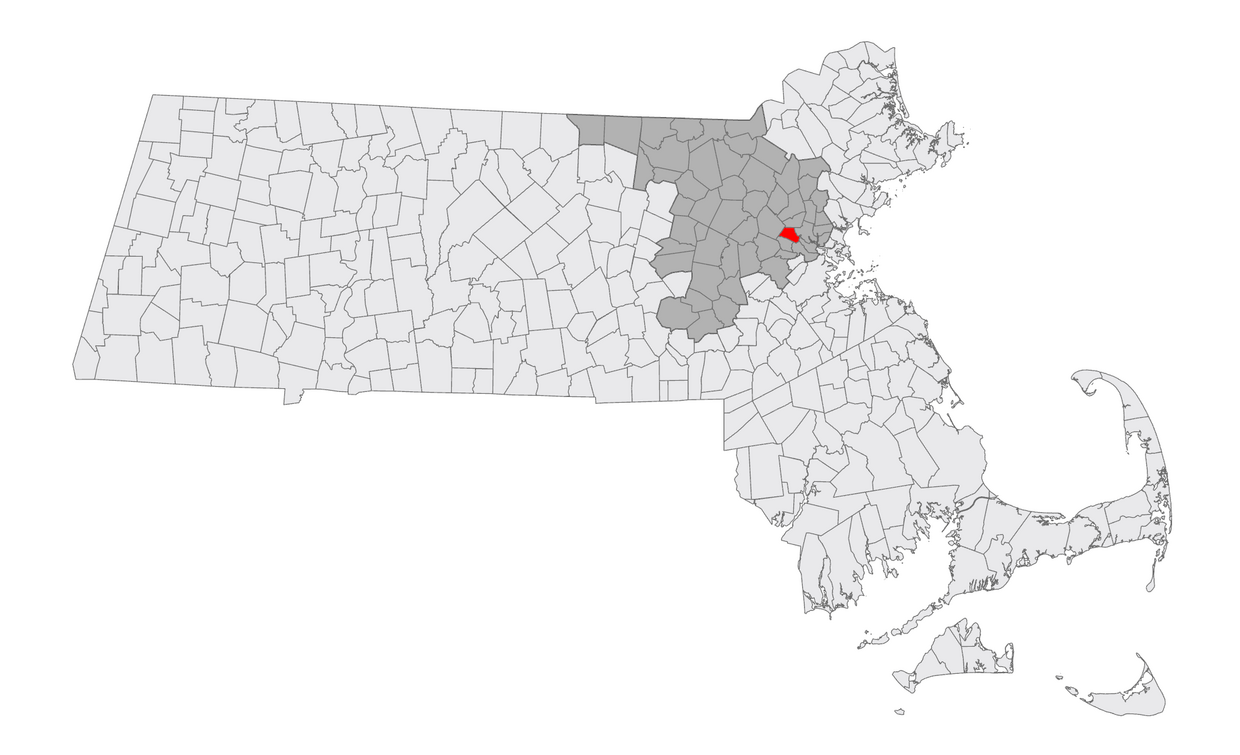Arlington Overview
Arlington is a town in Middlesex County, Massachusetts, in the Eastern part of the state. They have a population of 45,617 people and an area of 5.2 square miles. Climate hazards present in Arlington include inland flooding, severe winter storms, and extreme temperatures.
Arlington Core Team
The MVP 2.0 Core team is a group of municipal staff and Community Liaisons who work together to identify local climate resilience priorities and implement a project that supports those priorities.
Arlington's Community Liaisons include:
- Chinese American Association
- Drake Village Affordable Housing
- Veterans Commission
- Winslow Towers Affordable Housing
- Disability Commission
- Cusack Terrace Affordable Housing
- Arlington EATS
Arlington's Core Team includes municipal representation from:
- Community Outreach & Engagement Coordinator
- Deputy Town Manager
- Director of Health and Human Services
- Chief of Police
- Science Director, Arlington Public Schools
- Engineering
Arlington Community Resilience Priorities
Community resilience priorities are practical actions created during the MVP 2.0 Planning Grant process. They were shaped through community input, thoughtful discussion about changing local needs, and feedback from Environmental Justice groups and other community members.
Arlington, in partnership with their Core Team, identified the following priorities through the MVP 2.0 process.
| Priorities | Potential Actions | ||
|---|---|---|---|
| Priority 1: Improve access to affordable housing for low-income residents by expanding rental assistance programs and advocate for increasing the number of affordable housing units. | Potential Actions: Expand emergency (post-disaster) and short-term rental assistance programs. Implement enforceable rent control measures. | ||
| Priority 2: Foster inclusiveness and build trust within the Arlington community by removing language barriers, improve relationships between residents and agencies, and organize activities that promote a sense of belonging and value among residents. | Potential Actions: Translating all official Town communications into multiple languages. Providing free translation services for community-focused events and information-sharing. | ||
| Priority 3: Expand existing transportation options and Improve accessibility of existing transportation services, especially for vulnerable, marginalized, and/or underserved populations to access essential services such as doctors appointments and grocery shopping. | Potential Actions: Expand Council on Aging transportation services. Establish a shuttle service between key locations around town. Expand current MBTA routes. | ||
| Priority 4: Improve both routine and emergency support for community members living with disabilities and chronic health issues. Improve community-wide access to local health services by exploring opportunities to bring urgent care and 24-hour clinic options to Arlington. | Potential Actions: Establish emergency evacuation services and protocols for residents with medical or mobility needs. Ensure shelters are adequately prepared to accommodate medical equipment and service animals | ||
| Priority 5: Improve food justice and reduce food insecurity by expanding existing food support networks to include more culturally relevant options and removing barriers to accessing affordable, healthy, and culturally-appropriate foods. | Potential Actions: Expand the range of healthy and culturally-appropriate food options provided by current food support programs. Expand transit options for food access. | ||
| Priority 6: Improve community awareness of local environmental issues and increase involvement in local ecosystem enhancement initiatives efforts in order to build relationships and promote a sense of shared responsibility. | Potential Actions: Improved community education about recycling streams and local waste management. Explore partnering with local orgs. To provide broader education about climate change, healthy environments, and pollution prevention. | ||
| Priority 7: Invest in improved infrastructure for community health, safety, and wellbeing; including improved sidewalks for a range of mobility levels, expanded outdoor shading and cooling for respite from extreme heat, designated indoor cooling centers, and expanded communications infrastructure for sharing critical information. | Potential Actions: Working with local businesses and service providers to establish designated cooling centers. Building more shade structures and water features in public locations such as parks, transit stops, and shopping areas. | ||
| Priority 8: Invest in economic stability and access to employment opportunities by providing additional resources and support for job seekers, especially recent immigrants and those who are un- or under-employed, as well as those whose jobs are most likely to be impacted by climate changes, such as seasonal and outdoor workers. | Potential Actions: Creating and maintaining a centralized job bank or job board for all job openings in Arlington or within a reasonable commuting distance. Ensure all resources are accessible in multiple formats and languages. | ||
Arlington's MVP 2.0 Seed Project: Cool & Connected Arlington
Arlington received funding to implement a Seed Project that addresses one or more of their climate resilience priorities. They aims to create a network of safe spaces where community members can find relief from extreme heat and access important social services. These centers will not only offer a break from the heat but will also serve as information hubs, providing resources and assistance for those in need. Trained staff and volunteers will be available to help community members access services like healthcare, food assistance, and mental health support.
The activities of this project include:
- Determine Town department to oversee implementation
- Assess community need and hire external consultant support
- Coordinate across Town departments and community services groups;
- Conduct robust community engagement plan
Arlington's Action Grant Projects
The MVP Action Grant provides funding to communities that want to take important steps to prepare for climate change, such as dealing with extreme weather, flooding, rising sea levels, and extreme heat.
Mill Brook Corridor Flood Management Demonstration Project: Pilot Study & Implementation (FY18)
The Town of Arlington expanded upon an project supported by Community Preservation Act funds to survey the Mill Brook corridor, design public access improvements between Wellington Park and the Brook and enhance the natural resources of the Brook and surrounding areas. Improvements to Mill Brook include invasive plant removal, flood storage capacity, bank stabilization, and revegetation.

Wicked Hot Mystic (FY21)
This project partnered with the Resilient Mystic Collaborative provided high-resolution, watershed-wide, baseline data on ground-level air temperatures, humidity, wind, and particulate matter. These data will drive social resilience work in the region. The project included recruiting, training, and supporting youth and adults from the local community in conducting this local STEM learning opportunity and data gathering initiative.

Arlington has also participated in the following projects as a regional partner or as a member of the Resilient Mystic Collaborative Upper Mystic Working Group and the Metro Mayors Coalition:
- Wicked Cool Mystic - Súper Fresco Místico FY25, lead by the City of Everett
- Retrofits to Facilities that Host or Serve Priority Populations FY24, lead by the City of Burlington
- Metro Mayors Cool Roof Project FY24, lead by Metropolitan Area Planning Council (MAPC)
- Beat the Heat: Wicked Cool Outdoors / Venza el Calor: Súper Fresco Afuera FY23, lead by the City of Everett
- Building Resilience Across the Charles River Watershed Phase III FY23, lead by the City of Natick
- Maillet, Sommes, Morgan Constructed Stormwater Wetland FY23, lead by the City of Reading
- Hurld Park - Heat Resilient Park FY23, lead by the City of Woburn








